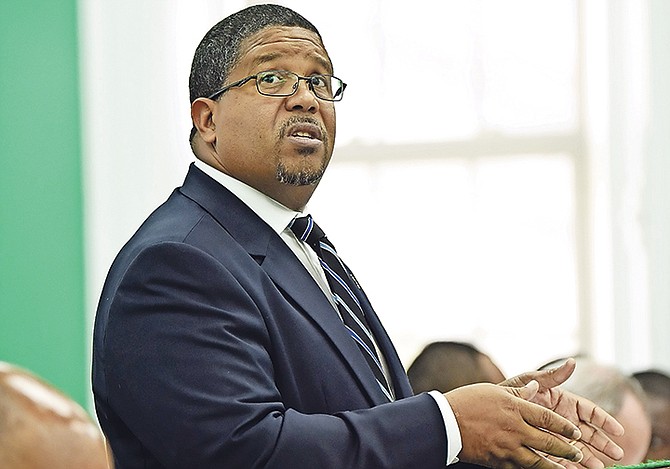By YOURI KEMP
Tribune Business Reporter
ykemp@tribunemedia.net
The deputy prime minister yesterday revealed that the government has made no provision for a public sector minimum wage increase in this year's Budget with Cabinet still discussing the issue.
K Peter Turnquest, speaking ahead of the weekly Cabinet meeting, said: "We do not have in our budget this year for a minimum wage increase. Cabinet is still discussing the matter, so it would be premature for me to give any definitive statement on it.
"As you know, we are in the middle of negotiations with a number of unions and some are about to come up. So this will all be a part of what we have moving forward on how we address all of the labour issues before us, and how we settle all these matters as quickly as possible."
Mr Turnquest's remarks raise questions over how close the government actually is to approving a public sector minimum wage increase, and the extent of any rise. The prospect of this was first raised by the prime minister in comments to reporters last week that public sector employees can expect a minimum wage increase, but he did not go into details.
Dr Minnis also indicated that an increase to the private sector minimum wage, which currently stands at $210 per week, would only happen after consultations with employers to determine the impact on jobs/hiring, investment and the overall economy.
However, Peter Goudie, vice chairman of the National Tripartite Council (NTC) and the Bahamas Chamber of Commerce and Employers Confederation's (BCCEC) representative on labour relations, said that the NTC - the body that deals with discussions on the minimum wage - has no knowledge of what the prime minister.
Then John Pinder, director of labour, said the government was eyeing an increase in the public sector minimum wage to between $300 to $350 per week. That represents an increase of between 42.9 percent and 66.7 percent.
Taking the lower $300 threshold, and Mr Pinder's estimation that 2,000 or ten percent of the Bahamas Public Services Union's (BPSU) 20,000 members will benefit, this translates into an annual $4,680 increase for every minimum wage worker and adds around $9.36m to the government's yearly payroll.
Mr Pinder said any minimum wage increase in the public sector was designed to force the private sector to follow suit. Should the Government do it for one group, the pressure from other public sector unions and private sector employees to follow suit is almost guaranteed as it is only the BPSU that will benefit.
And Dion Foulkes, minister of labour, also said a public sector minimum wage hike will occur this fiscal year - directly contradicting Mr Turnquest, who said there were no monies allocated in the Budget for it. The mixed comments coming from government are thus increasingly adding to the suspicion that Dr Minnis's comments were merely designed to cool a volatile industrial relations climate.
Responding to Philip Davis, the Opposition leader, advocating for a "livable wage" as opposed to just an increase in the minimum wage, Mr Turnquest yesterday said: "Again, everybody would advocate and support a 'livable wage'. However, there are limitations in any system.
"Those of us who have been private sector employers know what the pressure is of all of the personnel costs that are a part of operating a business, particularly a service business. And so we have to take all of these things into account to make sure we do not stifle the growth that we have started to see over the last two years. We have been on a reasonable path, and we have to make sure that we continue to stoke that and not do anything that may discourage people from investing and from the upward trend we have seen."
The first, and last, increase in the private sector minimum wage occurred in mid-2015 in a bid to cushion the impact of Value-Added Tax's (VAT) introduction - and associated cost of living increases - on low income earners.
The 40 percent rise from $150 to $210 per week was the first such occurrence since the minimum wage was introduced by law in The Bahamas in 2002. Pressure for further increases has come at regular intervals due to The Bahamas' economic difficulties over the past decade, especially when factors such as the VAT rate rise to 12 percent reduce household purchasing power.
Many Bahamians argue that $210 per week, or $840 per month, is not a "liveable" wage and it is impossible to make ends meet with such an income - especially if the worker has a family to support - given the constant rise in the cost of living.
However, minimum wage increases come with other consequences. They inevitably increase employer costs, especially marginal labour expenses, which can result in companies laying-off staff or becoming reluctant to take on new hires.
Given that those earning minimum wage salaries tend to be young workers, such as school leavers, just entering the workforce, any reluctance by employers to hire at an increased salary could create barriers to entering the world of work. There is also a social cost to this, as young, unskilled minimum wage earners are often those responsible for the current level of crime.
Companies could also choose to pass increased minimum wage costs on to consumers, raising the cost of living, while any increase in salary at the workforce's lower end can result in greater expectations for a rise among higher-salaried workers - leading to cost-push inflation.





Comments
Use the comment form below to begin a discussion about this content.
Sign in to comment
OpenID